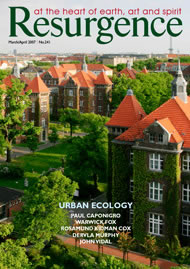THE REVEREND Gilbert White lived for most of his life in the tiny village of Selborne in Dorset. Aside from his duties as the local curate, his driving passion in life was the natural world. Most significantly he took to writing about it and did so with an Attenborough-esque facility in communicating his interest to others. So much so, that his masterwork, The Natural History and Antiquities of Selborne, first published in 1789, is world-famous. In it he examined minutely the birds and beasts that lived about him. He did this not in the manner of the professional scientists of his time but through his own methods of detailed observation. Working at the very dawn of zoology, precisely because he was not a traditional scientist, he wrote of his subject maintaining a hint at a bigger picture, thereby delivering the earliest whispers of the idea of a universal system of living things. Among the inhabitants of White’s garden was a tortoise named Timothy. Verlyn Klinkenborg’s delightful book is the imagined bio-
graphy of that creature and his time in the company of one of the world’s greatest amateur naturalists.
This may seem an odd premise for a work of fiction, and indeed much of the merchandising of this book has focused on trying to firmly locate it in the natural history section of your local bookshop. This is unfortunate, for it is a masterful novel. The pleasure in it lies not simply in how it evokes all that is most magical about White’s original work but, more importantly, in the way in which it realises the character of Timothy. In this process all kinds of remarkable depth and contrast are created that alter the way in which we are encouraged to observe nature.
Timothy is more than familiar with the interests and goals of Mr Gilbert White and the other humans that commune with him: “Quickness draws their eye. Entangles their attention. What they notice they call ‘reality’. But ‘reality’ is a fence with many holes, a net with many tears. I walk through them slowly. My slowness is deceptively fast.” Humans, he observes, are a “damp clutch of mammals”.
This tortoise labours slowly across the garden musing on the outrages he has suffered at the hands of humans. Snatched by a passing sailor from some sun-baked Turkish shore. Transported by boat to these freezing climes where he finds himself effectively a prisoner of a creature that wholly and completely underestimates him, while at the same time both patronising and, albeit unintentionally, abusing him. Yet Timothy remains philosophical about it all. He can rise above those too ignorant to treat him with respect. He has the wisdom and patience to ponder the folly of their thinking with objectivity: “The action of every animal, every insect comes down at last to this overwhelming purpose: the intercourse between the sexes. True enough perhaps. But mark the application. Judge the naturalist as narrowly as he judges the rest of creation. Merely a beast like any other, after all. Tottering, stilt-
gaited, praying, reasoning. Man of system. Man of the cloth. But blood, brain, bowels, and bile nonetheless.”
Timothy’s crisp sentences echo the mood of his character, his air of meditation and the deepest consideration. Nothing misses his timeless attention. The writing consistently maintains a direct connection with its inspiration yet subtly transforms the focus, as in this description of a line of forest on a hill above the house: “Hour by hour shifts in the greening of spring. Beautiful rimes. Picturesque tinges. Autumnal scenes. Most lovely lights and shades. Birds’ eggs and nests, acorns and berries. Smooth grotesque bark of the oldest beeches. Fetid hellebores in the undergrowth. Orchids and periwinkle and gentian. Whole childhoods hidden in its shade.”
The book is exquisitely pieced together from an impressively complete knowledge of White’s masterpiece, presenting the cornucopia of the natural world through the eyes of one of its own inhabitants, while adding an unexpectedly vivid portrait of the nature of humans. And the depth of Timothy’s feeling is so clear that never once do you come to doubt him. Rather, even if you were to find yourself thinking “but this is only another man’s idea of the mind of an animal,” you feel the justice of what is said beneath this and you can’t refute it. Instead you are delighted and privileged to find a window upon the greater possibilities of a larger appreciation of our world. A reminder that a little more humility in our relations with our planet and its other myriad inhabitants wouldn’t go amiss. As Timothy himself observes, “I think of those who have not lived to see what I have seen. Wonder that only I, of all my race, should be present here to notice. Weltering flocks on wing overhead. Aurora dimming the northern stars. But the first condition of beauty is survival.”







